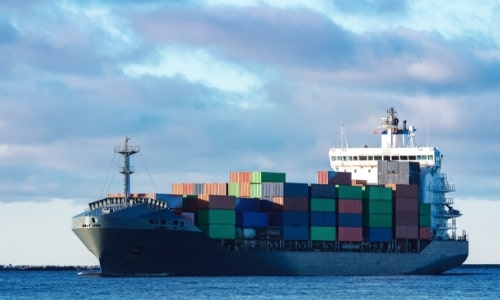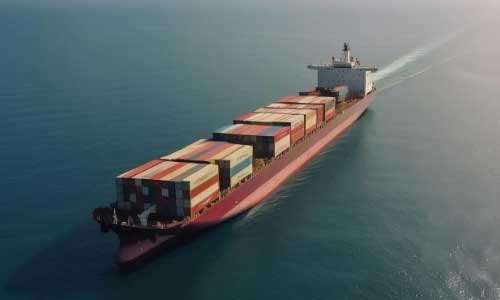Marine Insurance vs. Freight Insurance
Shipping goods across international waters involves significant risks — from accidents and piracy to natural disasters and human errors. That’s where marine and freight insurance become essential tools in safeguarding your business. While both offer essential protection, they cover different parties ...read more

- Best Coverage for the Lowest Price
- Quick & Hassle-free Policy Issuance
- Dedicated Teams for express Claims
Safeguard Your Business from Sea’s Uncertainties - Act Now !
What is Marine Insurance?
Marine insurance is a comprehensive policy that protects cargo, ships, terminals, and all types of transport involved in moving goods from one place to another — by sea, air, land, or a combination of modes.
In the UAE, home to major shipping hubs like Jebel Ali Port and Khalifa Port, marine insurance plays a crucial role in supporting importers, exporters, logistics firms, and freight forwarders. This helps to mitigate the risks associated with international trade and transport.
Key Features of Marine Insurance in UAE
- Covers physical loss or damage to goods in transit
- Includes hull insurance for ships and cargo insurance for goods
- Available as single-transit or open policies for regular shippers
- Customisable to include risks like war, strikes, or natural disasters
- Provides warehouse-to-warehouse protection across borders
Why Does Marine Insurance Offer Broader Protection?
Marine insurance is preferred by businesses in the UAE due to —
- Full protection for high-value or delicate cargo
- Compliance with international trade rules
- Financial coverage for multimodal transport including sea, land, and air
- Tailored policies for regular shippers (open cargo policies)
- Claims support and recovery even when multiple parties are involved
What is Freight Insurance?
Many ask: what is freight insurance, and how is it different from marine insurance? Here’s a simple breakdown:
Freight insurance, or freight liability insurance, protects freight forwarders or carriers from legal liability if the goods they are transporting are lost or damaged. It doesn’t insure the cargo directly, but offers compensation to the logistics provider if they are found responsible for the loss.
Key Features of Freight Insurance in UAE
- Often part of logistics contracts or bills of lading
- Limited liability based on international conventions (like Hague or Montreal)
- Compensation is capped based on weight, not the value of goods
- Suitable for logistics companies, not cargo owners
- Not an “all-risks” policy—exclusions apply
Limitations of Freight Insurance
Unlike marine insurance, freight insurance comes with notable limitations —
- Only covers the freight forwarder's liability
- Compensation is minimal and weight-based
- Not suitable for protecting high-value shipments
- Does not cover natural disasters, piracy, or customs-related risks
Marine Insurance vs Freight Insurance: At a Glance
Understanding the difference between marine and freight insurance helps businesses choose the right protection based on their role in the supply chain.
Here’s a side-by-side breakdown —
| Factors | Marine Insurance | Freight Insurance |
|---|---|---|
| Purpose | Provides financial protection for ships, cargo, and associated third-party liabilities during transit | Covers the legal liability of freight forwarders or carriers in case of cargo loss or damage |
| Who Buys It | Purchased by cargo owners, importers, exporters, shipowners, and logistics operators | Bought by freight forwarders, transporters, and logistics companies to protect against claims |
| Coverage Type | Covers a wide range including cargo damage/loss, hull damage, piracy, war risks, and natural disasters | Covers loss or damage to goods due to the freight forwarder’s negligence or failure to deliver |
| Claim Basis | Claims are based on the declared value of goods, type of loss, and policy terms | Claims are limited and calculated based on weight, as per international conventions |
| Coverage Scope | Comprehensive – from supplier’s warehouse to buyer’s warehouse, including all transit stages | Limited – applies only to freight charges and liability, not the value of the cargo itself |
| Best For | Ideal for businesses wanting to protect the actual goods or vessels in transit | Best for logistics providers needing protection from legal claims made by cargo owners |
When to Choose Marine Insurance vs Freight Insurance in UAE
Choose marine insurance if:
- You are a cargo owner, shipper, or importer/exporter
- You want full protection against physical damage or loss
- You’re involved in cross-border shipping with high-value goods
Choose freight insurance if:
- You are a freight forwarder or logistics provider
- You need liability coverage for cargo damage during transit
- You want to protect your business from legal claims by clients
How to Buy Marine vs Freight Insurance in the UAE?
Securing the appropriate insurance becomes straightforward when you follow these key steps —
- Evaluate Your Risk: Identify the type of goods, shipping routes, and the value involved to understand your exposure.
- Choose the Right Policy: Decide whether you need marine insurance (to protect cargo and vessels), freight insurance (to cover carrier liability), or a combination of both.
- Compare Quotes: Use reliable platforms like Policybazaar.ae to compare policies and find the best deal.
- Customise Your Coverage: Add optional protections like war risk, strikes, or warehouse-to-warehouse coverage based on your trade needs.
- Complete the Paperwork: Finalise documentation, pay the premium, and ensure your shipment is fully protected.
Conclusion: Marine Insurance vs Freight Insurance
The key difference between marine vs freight insurance lies in who and what is being protected.
- Marine insurance covers goods, vessels, and associated transit risks and is designed for cargo owners and businesses involved in trade who want to insure the actual goods and vessels.
- Freight insurance covers the legal liability of carriers or freight forwarders and is for freight handlers who want to protect themselves from liability if the goods are lost or damaged due to their fault.
For comprehensive protection in the UAE’s dynamic shipping environment, many businesses opt for both. If you want expert guidance and the best policy options, reach out to trusted providers like Policybazaar.ae.
Frequently Asked Questions
Q1. Is freight insurance necessary?
Freight insurance isn't mandatory but is highly recommended. It protects your goods or liability during transit, reducing financial loss from unexpected events like damage or theft.
Q2. Why do ships need insurance?
Ships carry high-value cargo over risky routes. Marine insurance safeguards vessels and cargo from losses due to accidents, natural disasters, theft, or non-delivery during transit.
Q3. Why should I buy marine insurance?
Marine insurance protects your cargo, offers liability cover, ensures peace of mind, and meets international trade requirements. It also gives you a competitive edge with tailored coverage.
Q4. Who can buy marine insurance?
Anyone involved in transporting goods—importers, exporters, freight forwarders, logistic companies, ship owners, and even buyers or sellers—can purchase marine insurance.
Q5. Who typically needs freight insurance?
Shippers, freight forwarders, carriers, importers, and exporters commonly need freight insurance to protect themselves from liability and meet trade or contract requirements.
Q6. What factors affect freight insurance?
Freight insurance cost and coverage depend on the shipping route, value of goods, type of cargo, mode of transport, and the reliability of the trading partners involved.
More From Marine Insurance
- Recent Articles
- Popular Articles







.png)




